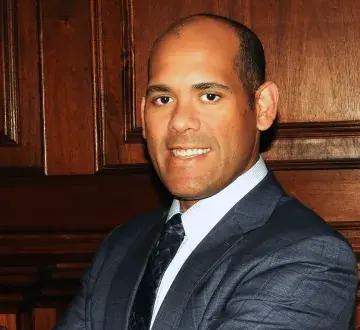Alumnus John A. Dorsey L’10 Appointed to Federal Bankruptcy Court

John A. Dorsey, RWU Law Class of 2010
Juris DoctorThe financial crisis of 2008 was a nerve-racking time to be a law student, to say the least, as unemployment rates rose and law firms rescinded associate job offers.
For John A. Dorsey L’10, the situation put him on a path to helping distressed companies. In September 2025, he took another step along that road, becoming a federal bankruptcy judge presiding over the U.S. Bankruptcy Court for the District of Rhode Island. The position gives him a new opportunity to use the creative problem-solving skills that he honed over 15 years working in roles including as a court-appointed receiver.
A Well-Rounded Student
Back when he was considering law schools, Dorsey was attracted to the community spirit he felt at Roger Williams University School of Law. He was an active law student, joining the Criminal Defense Clinic, moot court, and the trial advocacy team.
“I did those at the time because of my interest in engaging with the law, but I can undoubtedly say on the back end that each one of those opportunities gave me a great deal of knowledge and experience that absolutely benefited me through my legal career and ultimately helped me grow the skills to be able to pursue the bankruptcy bench,” says Dorsey.
When Dorsey graduated in 2010, “the economy was still not great.” With an interest in business law and litigation, receiverships were a good fit. In a receivership in Rhode Island, a struggling company files a civil proceeding in state court. The court appoints a receiver, a person who works with the insolvent company to preserve the company or maximize the value of assets to be liquidated. That was Dorsey’s role.
“One of the things that I really enjoyed in the practice of law was being able to work through receiverships and help businesses in difficult situations reposition themselves and be able to continue those businesses through a sale process,” Dorsey notes.
A Positive Impact
Unlike federal district judges, who are nominated by the president of the United States and confirmed by U.S. Congress, federal bankruptcy judges are approved by a majority of the judges in the court of appeals in the circuit where the district court sits. In the fall of 2024, the previous judge, Diane Finkle, announced her retirement, and Dorsey applied for the position as another chance to help troubled businesses and consumers.
“At this point in my career, my thought process was, what is the way that you can make the most impact to leave the situation better than you found it, and working from the bankruptcy bench is where I think I can have the most positive impact,” says Dorsey.
Dorsey encourages law students to participate in activities as he once did, and also to simply show up and view court proceedings. Because bankruptcy law covers the gamut of business issues a company may encounter, it provides a diverse experience for attorneys that he believes law students should consider. “Bankruptcy is really unique in that it touches all areas of the law,” he says. “So it doesn’t matter if, at the end of the day, you want to be a transactional attorney, or you want to be an environmental attorney, or you want to be a litigator, at some point in your practice, you’re going to confront the bankruptcy issue.”
As a practitioner, Dorsey recalls seeing businesses that he helped to maintain as going concerns through receivership going strong years later. He says, “For me to see a business be able to go through a financial struggle, survive through an insolvency proceeding, and then even under new ownership, still be an operating and now thriving business, is very rewarding.”
While he is still adjusting to his new position as a judge, he looks forward to helping not just businesses and consumers, but also the state’s economic climate. “If, at the conclusion of the time that I have on the bench, if I can through this process leave the economic conditions in Rhode Island better than how we found them, I think that’s a success.”
